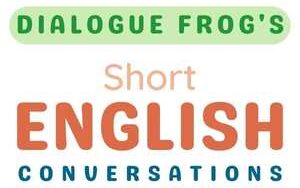Contractions in Spoken English | Website Building | 57
Luke is building a website. He is using a drag ‘n’ drop website tool. When you say “drag ‘n’ drop” it sounds like the word “dragon.” Contractions in spoken English can be difficult to hear and understand, even for native speakers, if the word is new, unfamiliar, or technical. There are several contractions in spoken English that you can hear in this episode.
To listen, press play in the audio player.
- Script
- Vocabulary
- Extras!
Emma (00:02):
Welcome to another dialogue in English with Dialogue Frog.
Luke (00:06):
So I've been workin' on a website.
Emma (00:08):
Oh, really? That's pretty cool.
Luke (00:10):
It's true. I've uh, been working on a side business, so I needed to make a website for it.
Emma (00:17):
Oh, a side hustle. That- that's pretty cool stuff. So, are you havin' fun?
Luke (00:22):
Uh huh. Yep. Uh, it's an interesting mix of fun and frustrating.
Emma (00:28):
Mm, I can see that.
Luke (00:30):
The fun part is the creativity and like kind of making it look how you want.
Emma (00:35):
Oh yeah. I like that part too.
Luke (00:38):
But then there's moments where you run into roadblocks where the tools don't q-quite let you do what you want some times, even though they're good most of the time, but it's like hard fo- hard to, uh, navigate those situations.
Emma (00:54):
So, you're talkin' about tools. It sounds like maybe, um, you're using more of like, a, I guess they're called drag 'n' drop, um, website builders? Like, you don't write code. Instead, you use the like, website building tools. Is that right?
Luke (01:08):
Yeah. There is- there is no dragons.
Emma (01:12):
Drag-
Luke (01:12):
Oh!
Emma (01:12):
And drop.
Luke (01:13):
Oh. Oh, that makes more sense.
Emma (01:17):
That'd be a good name for a website builder, actually.
Luke (01:19):
Yeah.
Emma (01:19):
Dragons.
Luke (01:21):
Um.
Emma (01:21):
It might exist, actually.
Luke (01:25):
Yeah. Um, I'm using a drag 'n' drop. Um, and uh, so far it's working good. I mean, I've been able to do most everything I need to, so.
Emma (01:39):
Pretty cool. You know, I was surprised when, um, when I first started building websites too, that it's actually kind of expensive.
Luke (01:48):
Yeah. It can add up real quick.
Emma (01:50):
Yeah. Uh, there's-there's cheaper ways to do it, but there's also more expensive ways to do it. And so it's just even navigating the different, uh, options for website hosting, and all that.
Luke (02:05):
Yeah.
Emma (02:05):
Yeah.
Luke (02:06):
Sure.
Emma (02:06):
Alright. Well, thanks for joining us for another dialogue in English with Dialogue Frog.
workin'
website
Oh, really?
That's pretty cool.
working on
side
business
side business
hustle
side hustle
havin'
uh huh
yep
mix
frustrating
Mm
I can see that.
part
creativity
like
kind of
look
moments
run into
roadblocks
tools
quite
even though
hard
navigate
situations
talkin'
it sounds like
guess
called
drag
'n'
drop
drag 'n' drop
builder
code
instead
Is that right?
dragons
Oh!
actually
exist
I mean...
able
You know,...
surprised
when I first started....
add up
real
quick
different
options
hosting
and all that
There are many contractions in spoken English. If you are a beginner, watch this video by 'Scratch Garden':
If you are an intermediate or advanced learner of English, check out the article "What Are Contractions?" by Richard Nordquist at the ThoughtCo. to learn more about why contractions in spoken English are so common. There is also a long list of contractions you can explore at the bottom of the article.
Using contractions in spoken English is important for sounding natural in informal conversations. Here are 10 common and uncommon contractions you might hear in conversation:
- it'd
- might've
- must've
- 'n'
- needn't
- ol'
- should've
- that'd
- what'll
- 'twas

